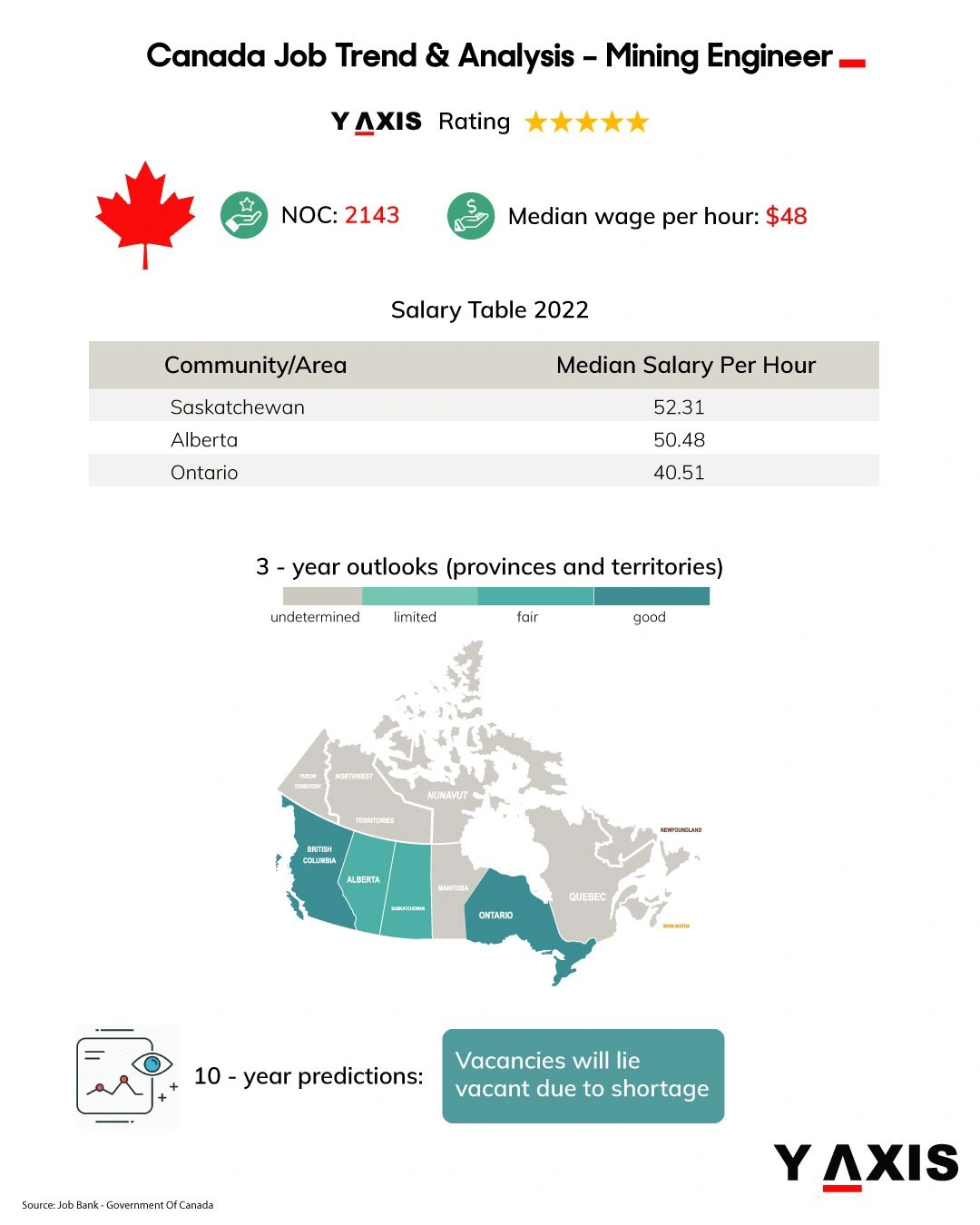Posted on September 08 2021
Job trends Canada – Mining Engineers
By , Editor
Updated November 14 2023
There are many job openings in Canada, and it plans to welcome more than 1 million immigrants to migrate and settle in 2022. Most individuals migrate to Canada with permanent residency (PR) these days because of the various immigration draws in Canada. Immigrants trying hard to get Permanent Residence can quickly get PR in Canada.
[embed]https://www.youtube.com/watch?v=YjCnVqqpTas[/embed]
So, immigrants in other countries who are trying hard to get the PR can directly migrate to Canada with PR and avail of its benefits.
Let us explore the job trends in Canada for Mining Engineers (NOC 2143).
Mining Engineers (NOC 2143)
Mining Engineers, NOC 2143 in Canada plan, design, organize and manage the development of mining industries. They are also involved in:
- Mine facilities
- Mining systems and equipment
- Prepares and supervise the extraction of metallic or non-metallic minerals and ores from underground or surface mines
List of companies that employ Mining Engineers
The Mining Engineers in Canada are employed by the following:
- Mining companies
- Consulting engineering companies
- Manufacturers
- Government and
- Educational and Research institutions
Prevailing wages in Canada for Mining Engineers
Mining engineers in Canada usually get wages ranging from $$ 28.59/hour and $$ 76.92/hour. If you want to negotiate a salary, plan your career or follow Y-Axis employment trends. You need to know how much a Mining Engineer earns in the region, etc.
Below are the prevailing wages in Canada for Mining Engineers in Canada.
| Community/Area | Wages ($/hour) | ||
| Low | Median | High | |
| Canada | 28.59 | 46.88 | 76.92 |
| Ontario | 28.59 | 36.54 | 60.36 |
| Saskatchewan | 38.46 | 57.69 | 80.29 |
Eligibility criteria for Mining Engineers in Canada
You may go through the below list of eligibility criteria required
- Bachelor's degree in Mining Engineering or any related Engineering discipline
- Master's degree or doctorate related to engineering discipline might be required
- Licensing approvals from a province or territory association related to professional engineers are required. This is required to approve engineering drawings and reports and practice as a Professional Engineer (P.Eng.).
- Engineers are eligible for registration if they have an accredited educational program and after three or four years of supervised work experience in engineering and passing a professional practice examination.
Roles and responsibilities of a Mining Engineer
A Mining Engineer in Canada has to perform the following roles and responsibilities. As a Mining Engineer they need to:
- Perform preliminary surveys and research on ores, mineral, or coal deposits to evaluate the economic and environmental viability of potential mining operations
- Find out the appropriate means of safely and efficiently mining deposits
- Determine and advise the procedures on drilling and blasting methods for mining, construction or demolition
- Design shafts, ventilation systems, mine services, haulage systems, and supporting structures
- Design, develop and implement computer applications related to mine design, mine modeling, mapping, and even monitoring mine conditions
- Plan and propose or select the mining equipment and machinery required, mineral treatment machinery and equipment, along with other engineering specialists
- Plan, organize, and direct the development of mines and mining structures and the process and maintenance of mines
- Arrange for mining operations, project estimates, schedules, and reports
- Create and execute mine safety programs
- Analyze and coordinate with the technicians, technologists, survey them personally, and work with other engineers and scientists to get a better output.
Checklist of Skills and knowledge required for a Mining Engineer in Canada The below listed skills and knowledge are essential to get qualified for NOC 2143.
Skills required
Management
- Co-ordinating and Organizing
- Evaluating
- Supervising
Analysis
- Inspecting and Testing
- Planning
- Analyzing Information
- Researching and Investigating
Communication
- Professional Communicating
- Advising and Consulting
Creative Expression
- Designing
Knowledge
Engineering and Technology
- Design
- Engineering and Applied Technologies
Law and Public Safety
- Public Safety and Security
Manufacturing and Production
- Processing and Production
Mathematics and Science
- Chemistry
Licensing and professional certification required for a Mining Engineer in Canada
As a Mining Engineer you need to get certified from a regulatory authority before starting your work. Below are the detailed list of provincial regulation requirements:
| Location | Job title | Regulation | Regulatory body |
| Alberta | Mining Engineer | Regulated | Association of Professional Engineers and Geoscientists of Alberta |
| British Columbia | Mining Engineer | Regulated | Engineers and Geoscientists of British Columbia |
| Manitoba | Mining Engineer | Regulated | Engineers Geoscientists of Manitoba |
| New Brunswick | Mining Engineer | Regulated | Association of Professional Engineers and Geoscientists of New Brunswick |
| Newfoundland and Labrador | Mining Engineer | Regulated | Professional Engineers and Geoscientists of Newfoundland and Labrador |
| Northwest Territories | Mining Engineer | Regulated | Northwest Territories and Nunavut Association of Professional Engineers and Geoscientists |
| Nova Scotia | Mining Engineer | Regulated | Association of Professional Engineers of Nova Scotia |
| Nunavut | Mining Engineer | Regulated | Northwest Territories and Nunavut Association of Professional Engineers and Geoscientists |
| Ontario | Mining Engineer | Regulated | Professional Engineers Ontario |
| Prince Edward Island | Mining Engineer | Regulated | Association of Professional Engineers of Prince Edward Island |
| Québec | Mining Engineer | Regulated | Ordre des ingénieurs du Québec |
| Saskatchewan | Mining Engineer | Regulated | Association of Professional Engineers and Geoscientists of Saskatchewan |
| Yukon | Mining Engineer | Regulated | Engineers of Yukon |
Job titles
- Mining Engineer
- Mine Design Engineer
- Mine Development Engineer
- Mine Layout Engineer
- Mine Production Engineer
- Mine Safety Engineer
- Mine Ventilation Engineer
- Mineral Engineer
Related occupations
- Engineering Managers
- Managers in natural resources production and fishing
- Geoscientists and Oceanographers
- Petroleum Engineers
- Metallurgical and Materials Engineers
- Geological Engineers
Mining Engineer in Canada (NOC 2143)
Mining Engineers in Canada have a range of job prospects based on the place they work in Canada. Find out future prospects of a Mining Engineer (NOC 2143) in the specific province or territory.
Job prospect over the next 3 years for Mining Engineers in Canada
You can explore the future job prospects of a Mining Engineer by province and territory in the below table:
| Location | Job prospects |
| Alberta | Fair |
| British Columbia | Good |
| Manitoba | Undetermined |
| New Brunswick | Undetermined |
| Newfoundland and Labrador | Undetermined |
| Northwest Territories | Undetermined |
| Nova Scotia | Undetermined |
| Nunavut | Undetermined |
| Ontario | Good |
| Prince Edward Island | Undetermined |
| Quebec | Undetermined |
| Saskatchewan | Fair |
| Yukon Territory | Undetermined |
Detailed analysis of Mining Engineer job prospects for next 10 years
For Mining Engineers, Geological Engineers, and Petroleum Engineers there is rise in demand for these positions from 2019-2028. These new job openings rises the expansion demand and replacement demand.
How a Mining Engineer can migrate to Canada?
There is a huge requirement for Mining Engineers in Canada. You can apply through Canada’s Federal Skilled Worker Program or can migrate to Canada through:
These are the best options for Mining Engineers to migrate to Canada.
How to check the eligibility score to Canada for free?
Candidates can check the eligibility score to Canada instantly through Y-Axis Canada skilled immigration points calculator for free.
Applicants who get their score check after meeting the above eligibility criteria and other details because it will assist in the following:
- Firstly, a positive evaluation of skill set will assist you in assessing the points for both the Express Entry CRS and the Federal Skilled Trades application.
- Secondly, the positive skills evaluation will help find Canada Equivalent Qualification, which will be used for professional registrations.
Candidates can permanently immigrate to Canada even if they don’t have a job offer but have a good CRS score and a Canada Federal Skilled Worker Visa. On the other hand, receiving a job offer would increase a person’s score by 50 to 200 points, allowing them to enter the country more easily.
Tags:
Job Trends
Mining Jobs in Canada
Share

